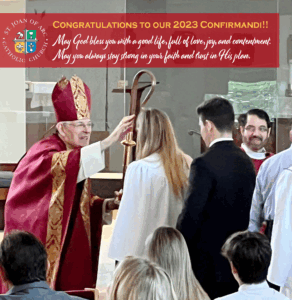Confirmation
The Sacrament of Confirmation
The Sacrament of Confirmation — along with the Sacraments of Baptism and the Most Holy Eucharist — form the “Sacraments of Initiation.” The Second Vatican Council, in Lumen Gentium, states that those who are baptized and then confirmed obtain the “special strength of the Holy Spirit” and become “more perfectly bound to the Church,” which means that “they are, as true witnesses of Christ, more strictly obliged to spread and defend the faith by word and deed” (Nr. 11).
The Form of the Sacrament of Confirmation:
Many people think of the laying on of hands, which signifies the descent of the Holy Spirit, as the central act in the Sacrament of Confirmation. The essential element, however, is the anointing of the confirmand (the person being confirmed) with chrism (an aromatic oil that has been consecrated by a bishop), accompanied by the words “Be sealed with the Gift of the Holy Spirit”.
The Minister of the Sacrament of Confirmation:
As the Catechism of the Catholic Church says, “The original minister of Confirmation is the bishop.” Each bishop is a successor to the apostles, upon whom the Holy Spirit descended at Pentecost—the first Confirmation. The Acts of the Apostles mentions the apostles imparting the Holy Spirit to believers by the laying on of hands.
Eligibility for Confirmation:
Priests can be authorized by their bishops to perform confirmations, and adult converts are routinely baptized and confirmed by priests. All those who have been baptized are eligible to be confirmed, and, while the Church suggests receiving the sacrament after reaching the “age of reason” (around seven years old), it can be received at any time. (A child in danger of death should receive Confirmation.) A confirmand must be in a state of grace. If the sacrament is not received immediately after Baptism, the confirmand should participate in the Sacrament ofConfession before Confirmation.
The Effects of the Sacrament of Confirmation:
The Sacrament of Confirmation confers special graces of the Holy Spirit upon the person being confirmed, just as such graces were granted to the Apostles on Pentecost. Like Baptism, therefore, it can only be performed once, and Confirmation increases and deepens all of the graces granted at Baptism.
The Catechism of the Catholic Church lists five effects of Confirmation:
1- It roots us more deeply in the divine filiation [as sons of God] which makes us cry, “Abba! Father!”;
2- It unites us more firmly to Christ;
3- It increases the gifts of the Holy Spirit in us;
4- It renders our bond with the Church more perfect;
5- It gives us a special strength of the Holy Spirit to spread and defend the faith by word and action as true witnesses of Christ.
Scriptural Passages Acts 8:14-17 – the people of Samaria were baptized in Christ, but did not receive the fullness of the Spirit until they were confirmed by the elders. Confirmation is a sacrament that Jesus Christ instituted within His Catholic Church to further strengthen those who have reached adulthood.
Acts 19:5-6 – the people of Ephesus were baptized in Christ, but Paul laid hands on them to seal them with the Holy Spirit. This sealing refers to the sacrament of confirmation.
Eph. 1:13 – Paul writes that the baptized Ephesians were sealed with the promised Holy Spirit, in reference to confirmation.
Eph. 4:30 – Paul says the Ephesians were sealed in the Holy Spirit of God, in reference to the sealing of confirmation.
Heb. 6:2 – Paul gives instruction to the Hebrews about the laying on of hands, in reference to confirmation, not ordination. The early Church laid hands upon the confirmand to administer the sacrament of confirmation.
Heb. 6:2 – this verse also refers to the cycle of life and its relationship to the sacraments – baptism, confirmation, death and judgment – which apply to all people.
John 6:27 – Jesus says the Father has set His seal on Him. As the Father sets His seal on Jesus, so Jesus sets His seal on us on the sacrament of baptism, and later, in the sacrament of confirmation.
Rev. 9:4 – the locusts could not harm those with the seal of God upon their foreheads. See also Rev. 14:1 and 22:4.

